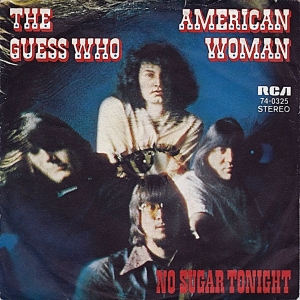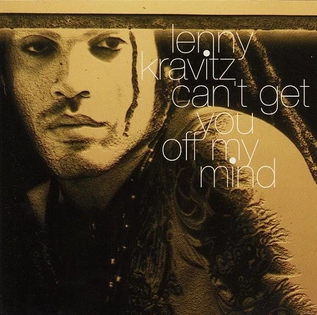
A vacuum cleaner, also known simply as a vacuum or a hoover, is a device that causes suction in order to remove dirt from floors, upholstery, draperies, and other surfaces. It is generally electrically driven.

Leonard Albert Kravitz is an American singer-songwriter and actor. His style incorporates elements of rock, blues, soul, R&B, funk, jazz, reggae, hard rock, psychedelic, pop and folk.

The Use Your Illusion Tour was a concert tour by American rock band Guns N' Roses which ran from January 20, 1991, to July 17, 1993. It was not only the band's longest tour, but one of the longest concert tours in rock history, consisting of 194 shows in 27 countries. It was also a source of much infamy for the band, due to riots, late starts, cancellations and outspoken rantings by Axl Rose.

Mama Said is the second studio album by American rock musician Lenny Kravitz, released in April 1991 by Virgin Records. Guns N' Roses guitarist Slash co-wrote and played on the song "Always on the Run". He also played on the song "Fields of Joy". The song "All I Ever Wanted" was co-written by Sean Lennon.

Lenny is the sixth studio album by American rock musician Lenny Kravitz, released in October 2001 through Virgin Records. It reached number 12 on the Billboard 200 and number 55 on the UK Albums Chart.

Cindy Blackman Santana, sometimes known as Cindy Blackman, is an American jazz and rock drummer. Blackman has recorded several jazz albums as a bandleader and has performed with Pharoah Sanders, Sonny Simmons, Ron Carter, Sam Rivers, Cassandra Wilson, Angela Bofill, Buckethead, Bill Laswell, Lenny Kravitz, Joe Henderson and Joss Stone.

"American Woman" is a song by Canadian rock band the Guess Who, released January 1970, from the album of the same name. It was later released in March 1970 as a single backed with "No Sugar Tonight", and it reached number one for three weeks commencing May 9 on both the United States' Billboard Hot 100 and the Canadian RPM magazine singles chart. Billboard magazine placed the single at number three on the Year-End Hot 100 singles of 1970 list, and it was listed as number five for 1970 on the RPM Year-End Chart. On May 22, 1970, the single was certified as gold by the Recording Industry Association of America (RIAA). It also reached the top ten in the Netherlands, Switzerland and Austria, and the top twenty in the United Kingdom and New Zealand.

5 is the fifth full-length studio album by American rock musician Lenny Kravitz, released on May 12, 1998, by Virgin Records. The album produced six singles released over the course of 1998 and 1999.

Christopher "MINK" Wingfield Morrison is a British American film director, writer, producer and comic book novelist.

"Dig In" is a song by American singer-songwriter Lenny Kravitz, the lead single from his sixth studio album, Lenny (2001). It was released in September 2001. It was used in promos by the National Basketball Association for the 2002 NBA Playoffs, as well as the ending theme for the film Returner.

Craig David Ross is an American guitarist best known for performing and recording with Lenny Kravitz.

Music of the Millennium III is the third and final edition in the Music of the Millennium album series. The album was released at the beginning of the third millennium and it includes some of the most influential names that have contributed to popular music in the 20th century. The album sees some of the biggest international hits from the 1960s, 1970s, 1980s and 1990s. Different versions of the album have been released including an international versions and a Japanese version. The international version was releases with two different designs on the front- and the back of the album cover.

Zoë Isabella Kravitz is an American actress, singer, and model. She made her acting debut in the romantic comedy film No Reservations (2007). Her breakthrough came with portraying Angel Salvadore in the superhero film X-Men: First Class (2011), which earned her nominations for a Teen Choice Award and a Scream Award. She rose to prominence playing Christina in The Divergent Series (2014–2016) and Leta Lestrange in the Fantastic Beasts film series (2016–2018).

"Fields of Joy" is an original song by The New York Rock Ensemble released 1971. Lenny Kravitz released a remake on July 16, 1991, as the third single from his second studio album Mama Said.

American singer Lenny Kravitz has released 11 studio albums, one greatest hits compilation album, four box set compilation albums, two extended plays, 58 singles, and eight video albums, including three live albums. His debut album Let Love Rule (1989) peaked at number 61 in the US, and while receiving generally positive reviews, it became a huge success in Europe but took a long time to reach success in the US. Its followers, Mama Said (1991) and Are You Gonna Go My Way (1993) sold better overall than his debut, achieving platinum and multi-platinum status respectively, establishing Kravitz in the music industry and expanding his success in Europe and South America. However, despite only a two-year gap between albums, personal issues such as substance abuse problems, the aftermath of divorce, and his mother Roxie Roker's illness led to a decline in commercial sales with Circus (1995).

Brief Encounters is a studio album by French singer Amanda Lear, released in 2009 by independent label Just Good Music for Your Ears.

Black and White America is the ninth studio album by American rock musician Lenny Kravitz, released on August 30, 2011. The album also produced six singles released in 2011 and 2012.

"Stand" is a song produced, written, arranged, composed and performed by Lenny Kravitz from his album, Black and White America (2011). It was released as the album's second single and the iTunes download release date for the song was June 3, 2011. The song was written by Kravitz about a close friend, who was paralyzed from the waist down from an accident, who later recovered.

Strut is the tenth studio album by American rock musician Lenny Kravitz. It was released on September 23, 2014 and was the first release on Kravitz's own Roxie Records, with distribution by Kobalt Label Services. The record also produced five singles released both in 2014 and 2015.

"Can't Get You Off My Mind" is a song written and performed by American singer and songwriter Lenny Kravitz and released in February 1996 as the third single from his fourth studio album, Circus (1995). The song was later included in the albums Greatest Hits (2000) and Lenny (2001) as a bonus track. There are two versions of the music video for the song: one was directed by Matthew Rolston, the other by Jim Gable.



















